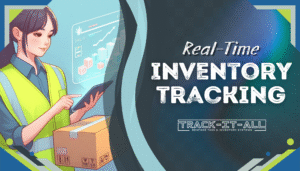Picture this: A growing business is struggling to keep track of its stock across multiple warehouses. Orders are delayed, customers are frustrated, and profits are shrinking. Without the right inventory management software, businesses often face challenges like these, leading to reduced efficiency and increased costs. But with the right tools, companies can take control of their inventory, optimize stock levels, and streamline operations.
In this post, we will explore the best inventory management software solutions, including their features and benefits, to help you manage inventory efficiently. We’ll also offer insights on choosing the right management system for your business needs. When running a business, it’s important to have a reliable inventory management system in place to keep track of stock levels, avoid stockouts, and streamline operations. With the help of a robust inventory management software, you can save time and effort by automating tasks such as order processing, stock movement, and reordering. To make an informed decision, conducting an inventory management software comparison will help you weigh the features, pricing, and scalability of different solutions to find the best fit for your business.
At Track-It-All, we specialize in delivering powerful inventory and warehouse management solutions. Our software helps businesses stay on top of their assets and stock levels, ensuring smooth operations across multiple locations.
Understanding Inventory Management Software
What is Inventory Management Software?
Inventory management software helps businesses track inventory levels, manage stock across warehouses, and maintain smooth supply chain operations. A good inventory management system integrates with other platforms, such as accounting software and point-of-sale systems, providing comprehensive data insights.
Key Features of Inventory Management Software
- Inventory tracking: Stay updated with real-time inventory tracking.
- Order management: Automate order and inventory management to improve efficiency.
- Barcode scanning: Quickly scan products for faster stock updates.
- Reporting and analytics: Gain insights to optimize inventory levels.
- Seamless integration: Connect with other systems like accounting software for small businesses.
Benefits of Using Inventory Management Software
- Improved accuracy: Avoid human errors with automated inventory tracking software.
- Reduced costs: Manage inventory across multiple locations efficiently to minimize overstocking.
- Increased efficiency: Implement inventory control solutions to save time and resources.
- Better decision-making: Use analytics to forecast stock requirements and improve operations management.
- Enhanced customer satisfaction: Ensure products are available when needed, avoiding delays.
Factors to Consider When Choosing Software
- Business Size and Needs: Different businesses have unique inventory needs. Small businesses may benefit from simple inventory software, while larger companies need advanced inventory management solutions.
- Budget: Some platforms offer free trials, while others come with enterprise-level pricing.
- Scalability: Choose cloud-based inventory management software that grows with your business.
- Ease of Use: Software designed with a user-friendly interface ensures smooth adoption.
- Integration Capabilities: Software includes connections to POS systems, ERP, and accounting software.
Top Inventory Management Software Systems
1. Track-It-All
Best for: Companies needing efficient asset and inventory management tools.
- Real-time tracking of inventory and assets
- Cloud-based platform with 24/7 accessibility
- User-friendly web and mobile interfaces
- Custom reporting and alerts for inventory and warehouse management
Track-It-All ensures you stay on top of stock levels, offering the perfect management solution for logistics, retail, and manufacturing industries.
2. Zoho Inventory
Best for: Small businesses looking for affordable options.
- Multi-channel sales management
- Inventory tracking across different warehouses
- Integrates with Shopify, Amazon, and eBay
- Offers a free trial for startups
Zoho Inventory provides a reliable inventory system with essential features like order automation and third-party integrations.
3. Cin7
Best for: Retailers with complex operations.
- Omnichannel sales management
- Connects with over 700 platforms, including QuickBooks
- Real-time stock visibility
- Automated reordering system
Cin7 helps businesses efficiently manage inventory across multiple locations and warehouses.
4. TradeGecko (QuickBooks Commerce)
Best for: Small companies using QuickBooks.
- Inventory forecasting and reporting
- B2B eCommerce portal for wholesalers
- Barcode scanning for accurate inventory tracking
- Integrates with QuickBooks accounting software
TradeGecko simplifies inventory control with seamless automation and reporting tools.
5. SAP Business One
Best for: Large enterprises.
- Real-time inventory tracking
- Batch and serial number management
- Integrated CRM and financials
- Customizable reports and analytics
SAP Business One offers enterprise-grade inventory and production management for businesses with advanced inventory management needs.
6. Fishbowl Inventory
Best for: Manufacturers and wholesalers.
- Raw material tracking
- Work order and job management
- Barcode generation and scanning
Fishbowl Inventory provides robust management software solutions for industries focused on manufacturing and wholesale.
7. Odoo Inventory
Best for: Businesses needing customizable tools.
- Lot tracking and batch management
- Integration with other Odoo modules
- Custom workflows for unique operations
Odoo is ideal for companies seeking open-source inventory management software solutions.
Comparing The Best Inventory Management Software Systems in 2024
| Software | Track-It-All | Zoho Inventory | Cin7 | TradeGecko | SAP Business One | Fishbowl Inventory | Odoo Inventory |
| Best For | Companies of all sizes | Small to medium-sized businesses | Retailers with complex inventory needs | Small businesses using QuickBooks | Large enterprises | Manufacturing and wholesale businesses | Customizable solutions for diverse needs |
| Real-time Tracking | ✅ | ✅ | ✅ | ✅ | ✅ | ✅ | ✅ |
| Cloud-Based | ✅ | ✅ | ✅ | ✅ | ✅ | ✅ | ✅ |
| User-Friendly | ✅ | ✅ | ✅ | ✅ | ❌ | ✅ | ✅ |
| Multi-Channel Sales | ✅ | ✅ | ✅ | ✅ | ❌ | ❌ | ✅ |
| Custom Reporting | ✅ | ✅ | ✅ | ✅ | ✅ | ✅ | ✅ |
| Barcode Scanning | ✅ | ✅ | ✅ | ✅ | ✅ | ✅ | ✅ |
| Free Trial | ✅ | ✅ | ❌ | ✅ | ❌ | ❌ | ✅ |
| Automated Reordering | ✅ | ✅ | ✅ | ✅ | ✅ | ✅ | ✅ |
| Integration with Accounting | ✅ | ✅ | ✅ | ✅ | ✅ | ✅ | ✅ |
| Customization | ✅ | ✅ | ✅ | ✅ | ✅ | ✅ | ✅ |
| Winner | Track-It-All |
Key Takeaways:
- Track-It-All stands out as the top choice, offering comprehensive features and customization options suited for various business sizes.
- Zoho Inventory and Odoo Inventory are excellent for small to medium businesses needing budget-friendly, flexible solutions.
- Cin7 is ideal for retailers looking for complex inventory management across multiple channels.
- TradeGecko is tailored for businesses already using QuickBooks, providing seamless integration.
- SAP Business One is a robust ERP solution for larger enterprises with extensive needs.
- Fishbowl Inventory excels in the manufacturing and wholesale sectors, providing specialized tools for tracking raw materials and work orders.
Implementing Inventory Management Software
Best Practices
- Data migration: Ensure accurate transfer of your inventory data into the new management system.
- User training: Provide training sessions to familiarize staff with the inventory software.
- Ongoing optimization: Continuously monitor and improve your inventory management process.
Common Challenges
- System integration: Some platforms may require custom setups for seamless warehouse management integration.
- Scalability: Ensure the software can adapt to your growing business demands.
Additional Considerations About Inventory Management Systems
Frequently Asked Questions (FAQs)
FAQ 1: What is inventory management software?
Answer: Inventory management software is a tool that helps businesses manage inventory levels, track inventory items, and optimize inventory across multiple locations. It includes features for order management, inventory control, and real-time inventory tracking.
FAQ 2: How can small businesses benefit from a warehouse management system?
Answer: A warehouse management system helps small businesses improve their operations management by providing advanced inventory management features. It enables better control of your inventory, efficient tracking of inventory levels, and ensures timely order fulfillment.
FAQ 3: What are the best inventory management software solutions for 2024?
Answer: The best inventory management software solutions for 2024 include cloud-based inventory management software like Zoho Inventory, Odoo Inventory, and NetSuite Inventory Management. These solutions offer comprehensive features for inventory tracking, order and inventory management, and accounting software for small businesses.
FAQ 4: Can I try inventory management software before purchasing?
Answer: Yes, many inventory management software providers offer a free trial, allowing you to explore their management software solutions. This helps you determine which software is best for your business needs before making a commitment.
FAQ 5: How does cloud-based inventory management help businesses?
Answer: Cloud-based inventory management provides businesses with the flexibility to manage inventory from anywhere. It offers real-time inventory tracking and allows for better collaboration, enabling businesses to stay on top of their inventory management process and track inventory across locations.
FAQ 6: Why is tracking inventory important?
Answer: Tracking inventory is essential for maintaining accurate inventory levels, optimizing inventory levels, and improving your inventory management process. Effective inventory control helps businesses reduce costs, minimize stockouts, and enhance customer satisfaction.
Conclusion
Choosing the right inventory management software is crucial for businesses to maintain inventory efficiency and optimize operations. From inventory tracking software to advanced warehouse management features, the right tools can transform your operations.
At Track-It-All, we’re committed to helping businesses improve their inventory management. Contact us today to explore management software solutions in South Africa 2024 that align with your business needs. Visit Track-It-All for more information.







